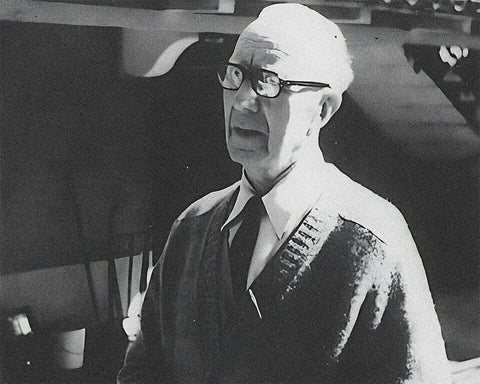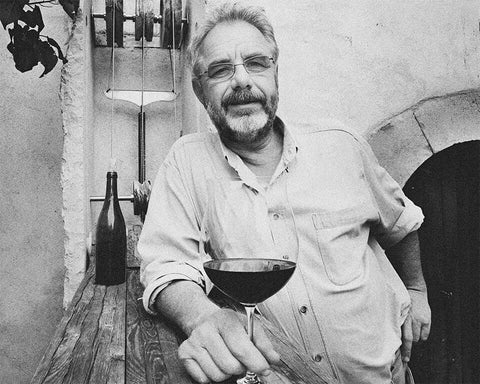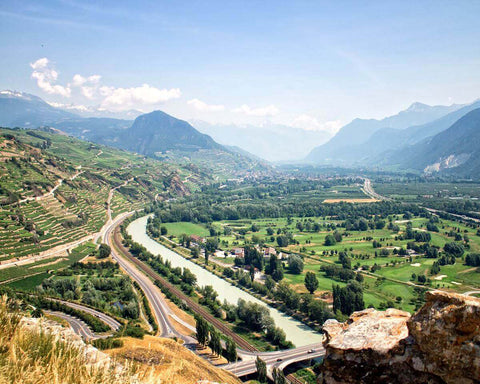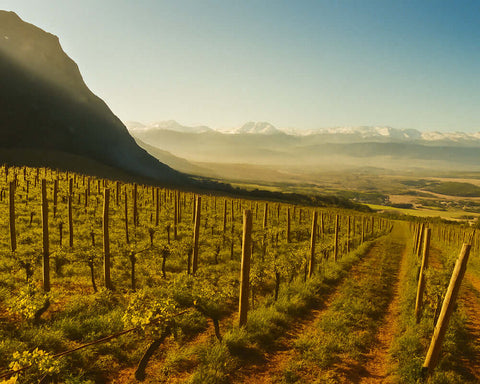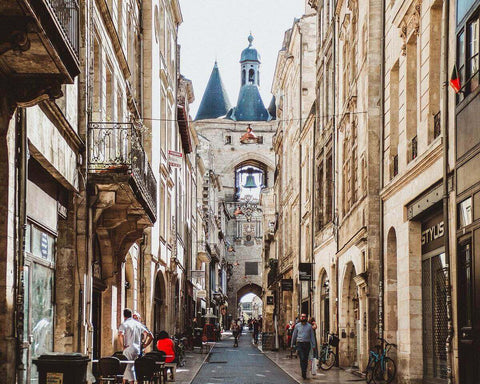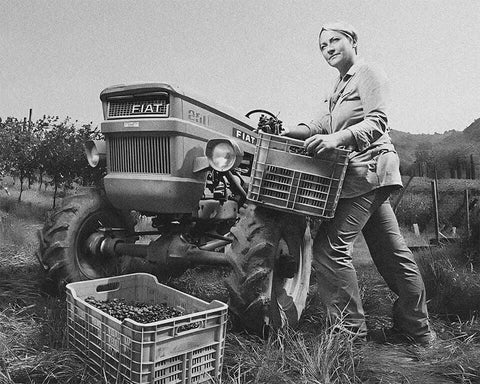In natural wine, few names carry as much weight as Jules Chauvet. Often referred to as the "godfather of natural wine," Chauvet's influence on modern winemaking practices, particularly in low-intervention and natural wines, cannot be overstated. This essay delves into the life, work, and lasting legacy of this remarkable figure who helped shape the wine world as we know it today.
Table of Contents
Early Life and Background
Jules Chauvet was born in 1907 in the small village of La Chapelle-de-Guinchay in Beaujolais, France. He came from a family of vignerons (winegrowers) who had been cultivating vines in the region for generations. This deep-rooted connection to the land and its traditions would be crucial in shaping Chauvet's philosophy and approach to winemaking.
Growing up among the vines, Chauvet developed a profound respect for nature and a keen interest in understanding the intricate processes that transform grapes into wine. His curiosity and thirst for knowledge led him to pursue studies in chemistry, a decision that would later inform his scientific approach to winemaking.
Professional Career
Chauvet's professional life was multifaceted. He wore many hats throughout his career:
- Vigneron: Tending to his family's vineyards in Beaujolais
- Négociant: Running a successful wine merchant business
- Researcher: Conducting groundbreaking studies on fermentation and wine chemistry
- Teacher: Sharing his knowledge with a generation of winemakers
The unique combination of these roles allowed Chauvet to develop his revolutionary ideas about winemaking.
The Négociant Years
In the 1940s, Chauvet took over his family's négociant business. As a négociant, he bought grapes or wines from other growers, then blended, aged, and sold them under his label. This role gave him a broad perspective on the wines of Beaujolais and the various winemaking practices in the region.
During this time, Chauvet began questioning the increasing use of chemicals in viticulture and the growing trend towards heavily manipulated wines. He believed these practices were masking the true expression of terroir and producing wines lacking authenticity and vitality.
The Researcher and Innovator
Chauvet's background in chemistry led him to approach winemaking with a scientific mindset. However, unlike many of his contemporaries who used their scientific knowledge to manipulate wines, Chauvet used his understanding of chemistry to minimize intervention in the winemaking process.
Some of his most significant contributions include:
- Studies on Carbonic Maceration: Chauvet conducted extensive research on carbonic maceration, a technique commonly used in Beaujolais. His work helped winemakers understand and refine this process, leading to higher-quality Beaujolais wines.
- Fermentation without Sulfur Dioxide: At a time when sulfur dioxide was used liberally in winemaking, Chauvet developed techniques for fermenting wine without added SO2. This was a radical idea that laid the groundwork for today's natural wine movement.
- Microbiology of Wine: Chauvet's studies on the microbiology of wine fermentation provided valuable insights into the role of native yeasts and bacteria in winemaking.
Chauvet's Philosophy and Approach to Wine
At the heart of Chauvet's approach to winemaking was a profound respect for nature and a belief in minimal intervention. He viewed winemaking not as a manufacturing process but as guiding a natural transformation.
Key Principles of Chauvet's Philosophy:
- Respect for Terroir: Chauvet believed that wine should be an expression of its place of origin. He advocated for practices that allowed the characteristics of the vineyard to shine through in the finished wine.
- Minimal Intervention: He championed a hands-off approach to winemaking, arguing that excessive manipulation stripped wines of their character and vitality.
- No Added Sulfites: Chauvet demonstrated that it was possible to make stable wines without the addition of sulfur dioxide, a practice that has become a hallmark of natural winemaking.
- Native Yeast Fermentation: He encouraged the use of native yeasts for fermentation, believing they contributed to the wine's sense of place.
- Rejection of Chaptalization: Chauvet was against the practice of adding sugar to increase the alcohol content, seeing it as an artificial manipulation of the wine.
Legacy and Influence
While Chauvet was respected in his time, the true extent of his influence only became apparent in the years following his death in 1989. His ideas, once considered radical, have become foundational principles for many winemakers worldwide.
The "Gang of Four"
Perhaps Chauvet's most direct influence can be seen in the work of the so-called "Gang of Four" in Beaujolais: Marcel Lapierre, Jean Foillard, Jean-Paul Thévenet, and Guy Breton. Inspired by Chauvet's teachings, these winemakers began producing wines using his methods in the 1980s. Their success helped bring natural winemaking practices to a wider audience.
The Natural Wine Movement
Today's natural wine movement owes a great debt to Chauvet. His emphasis on minimal intervention, native yeast fermentation, and wines made without added sulfites has become the cornerstone of natural winemaking philosophy. While Chauvet himself never used the term "natural wine," his approach essentially defined what we now understand as natural winemaking.
Scientific Legacy
Chauvet's scientific work continues to be relevant today. His research on carbonic maceration and wine microbiology is still cited and built upon by modern wine researchers. His ability to bridge the gap between scientific understanding and traditional winemaking practices set a precedent for a more holistic approach to enology.
Criticisms and Controversies
While Chauvet is widely revered in natural wine circles, his ideas have not been without critics. Some argue that his methods increase the risk of spoilage and lead to inconsistent wines. Others suggest that rejecting modern oenological practices can sometimes result in flawed wines.
However, proponents of Chauvet's methods argue that these risks are outweighed by the potential for producing unique, terroir-driven wines with vitality and character that cannot be achieved through more interventionist methods.
Conclusion: The Enduring Impact of Jules Chauvet
Jules Chauvet's life work represented a pivotal moment in the history of wine. By questioning the industrialization of winemaking and advocating for a return to more traditional, natural methods, he laid the groundwork for a movement that continues to gain momentum today.
Chauvet's legacy is not just about a particular style of wine but about a philosophy that emphasizes respect for nature, authenticity, and the true expression of terroir. As the wine world continues to grapple with issues of sustainability, authenticity, and the impact of climate change, Chauvet's ideas remain as relevant as ever.
Whether you're a devoted natural wine enthusiast or a curious novice, understanding the work of Jules Chauvet provides valuable insight into the philosophies and practices shaping some of the most exciting wines being made today. His life's work serves as a reminder that in wine, as in life, sometimes the most profound innovations come not from adding complexity but from stripping things back to their essential nature.
